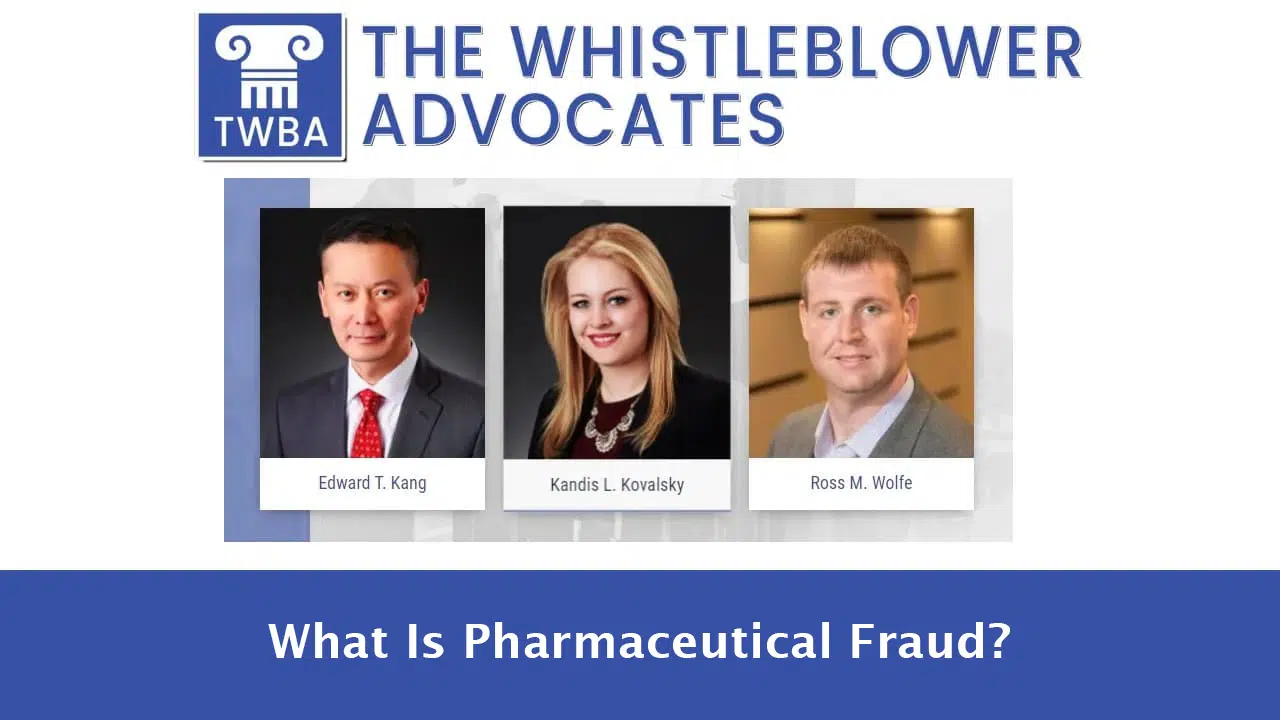Fraud by the pharmaceutical – including manufacturers, pharmacies, and PBMs – have resulted in some of the largest False Claims Act recoveries. For example, in 2012, GlaxoSmithKline (GSK) agreed to pay $3 billion to resolve allegations that it engaged in pharmaceutical fraud. The basis of this and similar actions is that one or more participants in pharmaceutical industry engaged in conduct that resulted in government healthcare programs, such as Medicare and Medicaid, being defrauded.
The fraudulent conduct underlying pharmaceutical FCA actions varies. Some cases involve prohibited sales techniques such as off-label marketing. Others involve paying kickbacks or bribes to doctors to prescribe their medications to patients. When either of these schemes occur, Medicare and Medicaid are almost always defrauded.
Many FCA actions brought to light that pharmaceutical manufacturers engaged in ”off-label marketing.” Off-label marketing is a type of pharmaceutical fraud that occurs when a pharmaceutical manufacturer promotes its drugs to prescribers for uses not approved by the Food and Drug Administration (FDA).
To provide some background information, when the FDA approves a drug, it approves the drug only for the particular use for which it was tested. In other words, the medication is approved to treat a specific medical condition. The United States Food, Drug and Cosmetic Act (FDCA) establishes the framework for regulation of the sales and marketing activities of pharmaceutical manufacturers in the United States, including the introduction of new drugs. While a physician can prescribe a drug for a use other than the one for which it is approved, the FDCA prohibits a drug manufacturer from marketing or promoting a drug for non-approved uses. It therefore is illegal for a drug manufacturer and its sales representatives to promote or initiate discussions with medical professionals regarding any off-label use of a drug.
If a pharmaceutical manufacturer promotes a drug for an “off-label” use and a doctor prescribes the medication for that use, fraud has occurred, as those drugs are generally not covered under Medicare and Medicaid. In some instances, a pharmaceutical manufacturer pays a kickback or bribery to physicians to encourage them to prescribe a drug for off-label use.
Kickbacks paid to prescribing physicians have also been the basis for substantial FCA actions. The federal Anti-Kickback Statute prohibits offering to pay or paying healthcare providers to prescribe drugs to their patients. When this occurs, Medicare and Medicaid are defrauded because the federal government does not pay for medications which were prescribed because the doctor was bribed to do so.
As mentioned above, a pharmaceutical company may pay a kickback or bribery to physicians to encourage them to prescribe a drug for off-label use. In some instances, a pharmaceutical company may pay a kickback or bribery to physicians to prescribe medications for intended purposes even though the patient does not need such medications.
While the kickback or bribery scheme appears straight forward, pharmaceutical companies may engage in a deceptive form of kickback or bribery scheme as they are aware of the prohibition. As a result, in many cases, the payment made to doctors is not in the form of an outright bribe, but many times is disguised as a speaker fee or consulting fee. Payment is made under these circumstances with a wink and a nod, and regularly results in the doctor prescribing the drug produced by the company making payment.
Paying doctors to prescribe medications not only endangers patients – as they are being prescribed medications not because they are the best solution for the patients’ condition – but also costs the federal government billions of dollars. In many cases, the drug prescribed is very expensive and, in the absence of a bribe, the patient would have been prescribed either a much less expensive, generic medication or no drug at all.
Compounded drug fraud is another significant issue in the pharmaceutical industry. This type of fraud involves the manipulation of compounded drugs to increase profit margins. Companies may use cheaper, inferior components to maximize profits, compromising the integrity of the product. In some cases, there may be issues of dilution where the active ingredient is spread across multiple units, essentially watering down the medication. The Federal Food, Drug and Cosmetic Act regulates compounded drugs to prevent such practices, and violations can result in fines and imprisonment.
Pharmacy Benefit Managers (PBMs) fraud is an increasingly common target of investigations. PBMs act as intermediaries between pharmaceutical companies and insurers, responsible for negotiating drug prices and rebates. Fraudulent practices by PBMs can include failing to pass savings from rebate arrangements and subsidies to clients, developing formularies that favor more expensive drugs, and improperly switching prescribed medications to either generics or different brand-name drugs. Drug manufacturers may also commit fraud by providing price concessions on certain drugs in exchange for a PBM's favorable coverage of their products.
Auto-refilling fraud is a practice where pharmacies automatically refill prescriptions without patient knowledge or consent, especially for chronic conditions. When a patient stops using a drug but the pharmacy is not promptly notified, the pharmacy may continue to charge Medicare or Medicaid for the cost of the medication. The pharmacy can then sell the medication to make a profit, repeating this process until the maximum number of refills is met or the prescription expires. This type of fraud has been the subject of several qui tam whistleblower cases under the False Claims Act

We serve clients throughout the Delaware Valley including, but not limited to, those in the following localities: Pennsylvania including Berks County, Bucks County, Chester County, Delaware County, Montgomery County, and Philadelphia.
Contact Us | The Whistleblower Advocates
Privacy Policy | Terms of Service
Please do not include any confidential or sensitive information in a contact form, text message, or voicemail. The contact form sends information by non-encrypted email, which is not secure. Submitting a contact form, sending a text message, making a phone call, or leaving a voicemail does not create an attorney-client relationship.
Copyright © The Whistleblower Advocates. All Rights Reserved